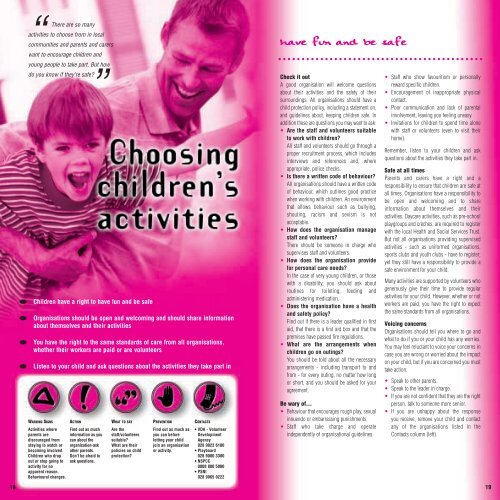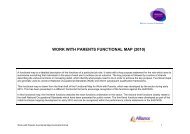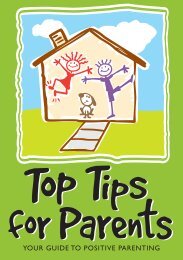Safe Parenting Handbook (PDF 1.07 Mb) - Department of Health ...
Safe Parenting Handbook (PDF 1.07 Mb) - Department of Health ...
Safe Parenting Handbook (PDF 1.07 Mb) - Department of Health ...
- No tags were found...
You also want an ePaper? Increase the reach of your titles
YUMPU automatically turns print PDFs into web optimized ePapers that Google loves.
WARNING SIGNS18“There are so manyactivities to choose from in localcommunities and parents and carerswant to encourage children andyoung people to take part. But how”do you know if they’re safe?Children have a right to have fun and be safeOrganisations should be open and welcoming and should share informationabout themselves and their activitiesYou have the right to the same standards <strong>of</strong> care from all organisations,whether their workers are paid or are volunteersListen to your child and ask questions about the activities they take part inActivities whereparents arediscouraged fromstaying to watch orbecoming involved.Children who dropout or stop going toactivity for noapparent reason.Behavioural changes.ACTIONFind out as muchinformation as youcan about theorganisation-askother parents.Don’t be afraid toask questions.WHAT TO SAYAre thestaff/volunteerssuitable?What are theirpolicies on childprotection?PREVENTIONFind out as much asyou can beforeletting your childjoin an organisationor activity.CONTACTS• VDA - VolunteerDevelopmentAgency028 9023 6100• Playboard028 9080 3380• NSPCC0808 800 5000• PSNI028 9065 0222have fun and be safeCheck it outA good organisation will welcome questionsabout their activities and the safety <strong>of</strong> theirsurroundings. All organisations should have achild protection policy, including a statement on,and guidelines about, keeping children safe. Inaddition these are questions you may want to ask:• Are the staff and volunteers suitableto work with children?All staff and volunteers should go through aproper recruitment process, which includesinterviews and references and, whereappropriate, police checks.• Is there a written code <strong>of</strong> behaviour?All organisations should have a written code<strong>of</strong> behaviour, which outlines good practicewhen working with children. An environmentthat allows behaviour such as bullying,shouting, racism and sexism is notacceptable.• How does the organisation managestaff and volunteers?There should be someone in charge whosupervises staff and volunteers.• How does the organisation providefor personal care needs?In the case <strong>of</strong> very young children, or thosewith a disability, you should ask aboutroutines for toileting, feeding andadministering medication.• Does the organisation have a healthand safety policy?Find out if there is a leader qualified in firstaid, that there is a first aid box and that thepremises have passed fire regulations.• What are the arrangements whenchildren go on outings?You should be told about all the necessaryarrangements - including transport to andfrom - for every outing, no matter how longor short, and you should be asked for youragreement.Be wary <strong>of</strong>…• Behaviour that encourages rough play, sexualinnuendo or embarrassing punishments.• Staff who take charge and operateindependently <strong>of</strong> organisational guidelines.• Staff who show favouritism or personallyreward specific children.• Encouragement <strong>of</strong> inappropriate physicalcontact.• Poor communication and lack <strong>of</strong> parentalinvolvement, leaving you feeling uneasy.• Invitations for children to spend time alonewith staff or volunteers (even to visit theirhome).Remember, listen to your children and askquestions about the activities they take part in.<strong>Safe</strong> at all timesParents and carers have a right and aresponsibility to ensure that children are safe atall times. Organisations have a responsibility tobe open and welcoming and to shareinformation about themselves and theiractivities. Daycare activities, such as pre-schoolplaygroups and crèches, are required to registerwith the local <strong>Health</strong> and Social Services Trust.But not all organisations providing supervisedactivities - such as uniformed organisations,sports clubs and youth clubs - have to register;yet they still have a responsibility to provide asafe environment for your child.Many activities are supported by volunteers whogenerously give their time to provide regularactivities for your child. However, whether or notworkers are paid, you have the right to expectthe same standards from all organisations.Voicing concernsOrganisations should tell you where to go andwhat to do if you or your child has any worries.You may feel reluctant to voice your concerns incase you are wrong or worried about the impacton your child, but if you are concerned you musttake action:• Speak to other parents.• Speak to the leader in charge.• If you are not confident that they are the rightperson, talk to someone more senior.• If you are unhappy about the responseyou receive, remove your child and contactany <strong>of</strong> the organisations listed in theContacts column (left).19






